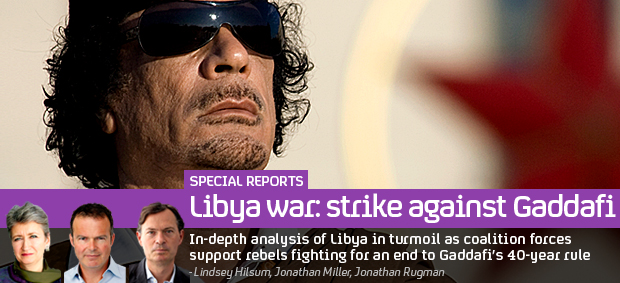Russia and China step up pressure on NATO over Libya
Russia and China step up pressure on the West over its action in Libya, urging “meticulous adherence” to the UN resolutions authorising the action. Lindsey Hilsum reports from Tripoli.
The resolutions, which were approved by the United Nations Security Council in March following the abstentions of China and Russia, authorised the use of “all necessary measures” to protect Libyan civilians after President Gaddafi threatened to send in troops to crush opposition in the city of Benghazi.
The imposition of a no-fly zone and attacks on pro-Gaddafi forces prevented a humanitarian crisis in Benghazi, but – 13 weeks later – the situation is increasingly looking like a stalemate, despite repeated NATO airstrikes on the President’s troops, his command facilities and his compound in Tripoli.
It is the scale of these assaults that is worrying both Russia and China and at a summit in the Kremlin, the Russian President, Dmitry Medvedev, and his Chinese counterpart, Hu Jintao, signed a joint declaration expressing their concerns.
‘Meticulous adherence’
The statement declared: “The sides express concern about the crisis situation in Libya. To avoid further escalation of the violence it is necessary to provide for the meticulous adherence by all sides involved (to the UN resolutions).”
Nations must not “allow the wilful interpretation and expanded application” of the resolutions, it added.
Russia has sent an envoy to Tripoli to seek to negotiate an end to the stand-off. Mikhail Margelov was taken, with foreign news teams, to the site of the latest NATO bombing – a building in the centre of Tripoli, near to government buildings which have already been bombed several times.
The Channel 4 News International Editor, Lindsey Hilsum – who is in Tripoli and was among the journalists taken to the scene by government minders – said the building appeared to be a hotel, although it had had no residents.
Asked about the NATO bombing campaign, Libya’s Deputy Foreign Minister, Khaled Kaim – speaking alongside Mr Margelov – replied: “It is not working and it will not work.”
Mr Margelov said later that the Libyan authorities had rejected any suggestion of Colonel Gaddafi stepping down from power.
But Saif Gaddafi, the colonel’s son, said in an interview with an Italian newspaper that his father might be prepared to hold elections – and to step down if he was defeated in such a vote – though he said the colonel would not agree to leave Libya.
“I have no doubt that the overwhelming majority of Libyans stand with my father and see the rebels as fanatical Islamist fundamentalists, terrorists stirred up from abroad,” he added.
